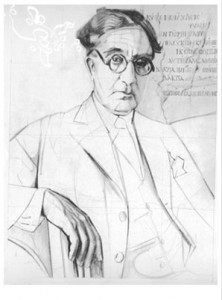Poetry in Translation (CXXXI): Constantine P. Kavafy (1853 – 1933), Poet Grec – “An old man”, “Bătrânul”
An old man
Constantine P. Cavafy (1863 – 1933)
At the back of the noisy café
bent over a table sits an old man;
a newspaper in front of him, without company.
And in the scorn of his miserable old age
he ponders how little he enjoyed the years
when he had strength, and the power of the word, and good looks.
He knows he has aged much; he feels it, he sees it.
And yet the time he was young seems
like yesterday. How short a time, how short a time.
And he ponders how Prudence deceived him;
and how he always trusted her — what a folly! —
that liar who said: “Tomorrow. There is ample time.”
He remembers the impulses he curbed; and how much
joy he sacrificed. Every lost chance
now mocks his senseless wisdom.
…But from so much thinking and remembering
the old man gets dizzy. And falls asleep
bent over the café table.
English version by George Barbanis:
http://users.hol.gr/~barbanis/
Bătrânul
Constantin P. Cavafy (1863 – 1933),
Poet Grec, născut în Egipt
La masa dela cafenea bătrânul şade îndoit.
E zgomot mult, dar singur e,
în fundul sălii, nevăzut, citind ziarul favorit.
Şi în dispreţul anilor trecuţi, se-ntreabă oare despre tot ce-a fost
cât de puţine vise a trăit
când era tanăr, chipeş şi cu rost.
El îşi dă seama cât a-mbătranit – o simte şi o ştie desluşit.
Şi totuşi vremea pare c-a fost ieri
O tinereţe ce a irosit. Timpu-a trecut, timpu-a trecut.
Se-ntreab-adesea cum de s-a-ntâmplat
Nesocotinţa ce l-a-nvăluit şi cât de mult el a crezut în ea;
Minciuna ce l-a năpădit: “mai este timp, mai este timp.”
Işi aminteşte vise ce-a avut, pe care le-a respins ca de pripas
când soarta i-a surâs, iar el n-a vrut
şi-acuma cu dispreţ îi râde-n nas.
Dar de-aste visuri care-au năvălit în mintea lui
bătrânu-a obosit. Închis-a ochii şi a aţipit
pe masa cafenelei îndoit.
(Rendered in Romanian by Constantin ROMAN, London,
© 2012, Copyright Constantin ROMAN)
BIOGRAPHICAL NOTE:
“I am from Constantinople by descent, but I was born in Alexandria—at a house on Seriph Street; I left very young, and spent much of my childhood in England. Subsequently I visited this country as an adult, but for a short period of time. I have also lived in France. During my adolescence I lived over two years in Constantinople. It has been many years since I last visited Greece. My last employment was as a clerk at a government office under the Ministry of Public Works of Egypt. I know English, French, and a little Italian.”
Constantine Cavafi died of cancer of the larynx on April 29, 1933, his 70th birthday. Since his death, Cavafy’s reputation has grown. He is now considered one of the finest European and modern Greek poets. His poetry is taught at schools in mainland Greece and Cyprus, and across universities around the world.
E.M. Forster knew him personally and wrote a memoir of him, contained in his book Alexandria. Forster, Arnold Toynbee, and T.S. Eliot were among the earliest promoters of Cavafy in the English-speaking world before the Second World War.[citation needed] In 1966, David Hockney made a series of prints to illustrate a selection of Cavafy’s poems, including In the dull village.





No Comments so far ↓
Like gas stations in rural Texas after 10 pm, comments are closed.